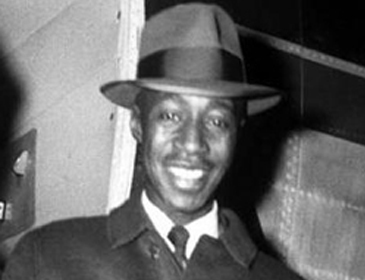
Kennard was arrested again on September 25, 1960 with an alleged accomplice for the theft of $25 worth of chicken feed from the Forrest County Cooperative warehouse. Kennard went to trial, with the accomplice, Johnny Lee Roberts, testifying that Kennard paid him to steal the feed. On November 21, 1960, an all-white jury deliberated 10 minutes and found Kennard guilty. (At this time, because of having been essentially disfranchised and unable to vote in Mississippi since 1890, blacks could not serve on juries.)
Kennard was sentenced to seven years in prison, to be served in Parchman Penitentiary, a high-security facility. Despite his alleged role in the crime, Roberts was given five years’ probation and freed. Years later, Roberts testified under oath that Kennard was innocent: “Kennard did not ask me to steal, Kennard did not ask me to break into the co-op, Kennard did not ask me to do anything illegal.”
Just after the conclusion of the trial, Mississippi NAACP official Medgar Evers was cited for contempt after issuing a statement that the conviction was “a mockery of judicial justice.” Evers was fined $100 and sentenced to 30 days in jail, but on June 12, 1961, the Mississippi Supreme Court overturned the conviction.
While imprisoned in 1961, Kennard was diagnosed with colon cancer and taken to the University of Mississippi hospital for surgery. The medical staff recommended that Kennard be put in their custody or that they be allowed to make regular visits to check on his condition. Authorities sent him back to Parchman Prison, where he worked as a laborer.
Civil rights leaders in Hattiesburg, Mississippi, embarked on a campaign to secure Kennard’s release. After the story gained national attention in 1963, Mississippi Governor Ross Barnett gave Kennard an “indefinite suspended sentence.”
Kennard was released on January 30th. The comedian Dick Gregory paid for his flight to Chicago, where he went for medical treatment. He twice underwent surgery at Billings Hospital on the University of Chicago campus over the next five months, but died of cancer 10 days after the latter procedure.
On July 7, a funeral service for Kennard was held at Metropolitan Funeral Parlor in Chicago. A poem he wrote on April 16, 1962 was read to the congregation. Sensing his limited lifespan, he titled the poem, “Ode to the Death Angel”
On December 31, 2005, Jerry Mitchell, an award-winning investigative reporter, published an interview with the informant Roberts. He asserted that his testimony in 1960 was false, and that Kennard had no connection to the crime. Mitchell, who had been investigating the case for many years, had previously helped some other infamous “cold cases” from the Civil Rights Era.
In 2006, three high school students from Illinois: Mona Ghadiri, Agnes Mazur, and Callie McCune, working with their teacher, Barry Bradford (renowned in 2002 for helping reopen the “Mississippi Burning” case) and Professor Steven A. Drizin of the Northwestern University School of Law, Center On Wrongful Convictions, spearheaded a movement to convince Mississippi Governor Haley Barbour to issue Kennard a full pardon. Against the advice of leading Mississippi politicians, academics, and media, Barbour declined to do so. A spokesman said that Barbour had never pardoned anyone and would not do so in Kennard’s case. Barbour designated March 30th as Clyde Kennard Day, calling for remembrance of Kennard’s “determination, the injustices he suffered, and his significant role in the history of the civil rights movement in Mississippi”
Students from the University of Southern Mississippi joined the campaign, and collected more than 1,500 signatures in support of the pardon. The students noted that by then, the university had more than 2,000 black students, which was the acceptance level which Kennard had sought. Despite pleas from four former Mississippi governors, on May 10, 2006, the Mississippi State Parole Board refused to recommend a pardon. The Board’s vote was split according to racial lines, with all of the white members’ voting to oppose a pardon recommendation.
Every major newspaper in Mississippi denounced the decisions of the Governor and the Board. Kennard’s brother-in-law, Rev. Willie Grant, expressed disappointment over the Board’s decision. He said the state appeared to be trying to avoid any potential litigation damages over wrongful imprisonment. The Kennard family had already said publicly that they had no interest in seeking damages.
Bradford and the students from Illinois shifted their efforts to using the courts to secure a reversal of the conviction. They contacted Charles Pickering, a former Federal judge, and William Winter, a former Mississippi governor, who fashioned precedent-setting legal strategy.
Using the historical research done by Bradford and the students, and the exhaustive legal research prepared by Drizin and Bobby Owens, a Northwestern University law student from Mississippi, the effort to clear Kennard’s name succeeded. Judge Bob Helfrich accepted a petition from “Barbour, several former judges, a university president and others” to rehear the case. After arguments by Pickering and Winter, heading a blue-ribbon legal team, on May 17, 2006, Helfrich threw out Kennard’s original burglary conviction, stating, “To me, this is not a black and white issue; it’s a right and wrong issue. To correct that wrong, I am compelled to do the right thing.” Barbour called the decision the “appropriate, constitutional way for this innocent man to be exonerated”.
The Kennard case aroused strong emotions. Six days after Helfrich’s decree, white supremacist Richard Barrett filed documents to throw out the decision. Barrett was a vocal supporter of Edgar Ray Killen, convicted in federal court in June 2005 of manslaughter in the killing of three civil rights workers in 1964. Barrett’s motion was summarily dismissed by Judge Helfrich. His appeal to the Mississippi State Supreme Court was likewise dismissed, ending the legal saga.
